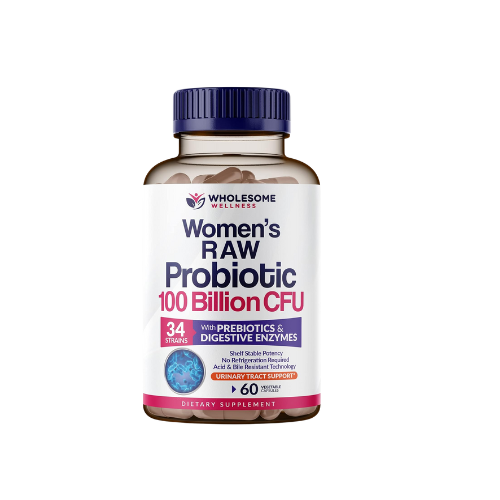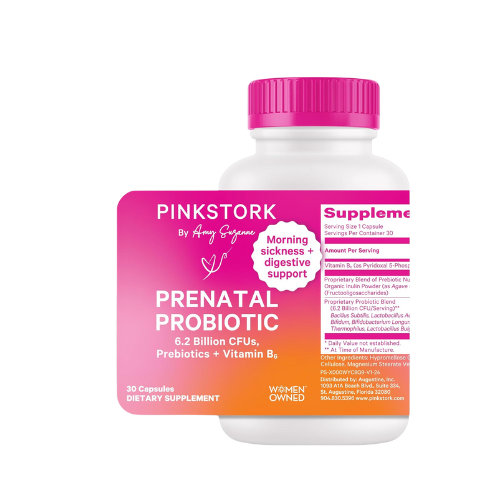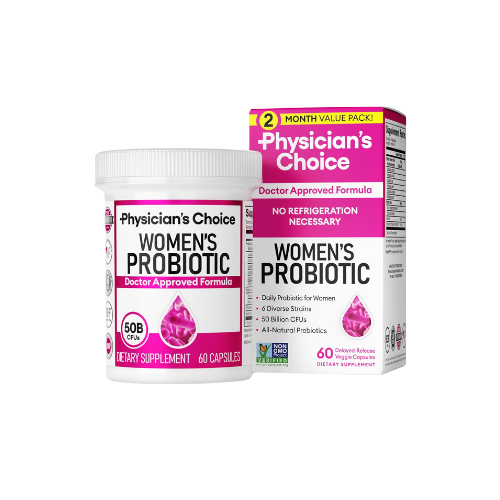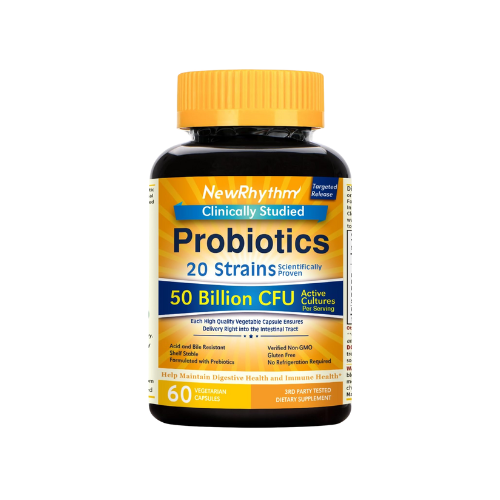


Medically Reviewed By Margaret Etudo. Written By The Vitamins For Woman Team.
Finding the best probiotics for pregnancy can be a game-changer, helping to support mom and baby through each stage. Here’s our guide to picking the perfect probiotic for this exciting journey.


medically reviewed by margaret etudo, BPharm. written by the vitamins for woman team.
We include products we think are useful for you. If you buy through links on this page, we may earn a small commission or other tangible benefits. Vitamins For Woman is owned by Medpenpal LTD. Here’s our process.
Probiotics have become a popular supplement for women, particularly during pregnancy, because they can support digestive health and immune function and even influence the baby’s microbiome. Probiotics are live bacteria and yeasts that contribute to a balanced gut microbiota when consumed in adequate amounts.
During pregnancy, digestive issues such as constipation, bloating, and indigestion are common, and probiotics can help alleviate them. Since pregnancy naturally lowers immunity, probiotics may provide extra immune support, potentially lowering the risk of infections like urinary tract infections (UTIs), which are more common during pregnancy.
New research shows that taking probiotics during pregnancy may benefit the baby’s microbiome, reducing the risk of conditions like eczema and allergies in early childhood. Certain strains, like Lactobacillus rhamnosus, Lactobacillus reuteri, and Bifidobacterium lactis, have shown promise in reducing the likelihood of allergies in babies by influencing immune responses.
Probiotics can offer valuable support during pregnancy, promoting digestion and wellness for mother and baby. Some of the best strains for pregnant women include:
Lactobacillus rhamnosus HN001 is a well-researched probiotic strain with multiple benefits for pregnant women. It eases digestive issues like constipation and bloating. This strain also strengthens the immune system, which is valuable during pregnancy when immunity is naturally lower.
Studies suggest that Lactobacillus rhamnosus HN001 may reduce the risk of allergies and eczema in infants by positively influencing their developing microbiome. It has also shown potential for lowering the risk of depression and anxiety in pregnant and postpartum women.
Bifidobacterium longum is a beneficial bacteria in the human gut that plays an essential role in digestive health. It helps break down food, produce certain vitamins, and prevent harmful bacteria from growing, reducing infection risks.
B. longum may reduce irritable bowel syndrome (IBS) symptoms, support mental wellbeing by interacting with the gut-brain axis, and improve the body’s immune response. It is known to produce short-chain fatty acids, like acetate and lactate, that support the health of the gut lining and may help reduce inflammation.
Bifidobacterium longum is a beneficial bacteria in the human gut that plays an essential role in digestive health. It helps break down food, produce certain vitamins, and prevent harmful bacteria from growing, reducing infection risks.
B. longum may reduce irritable bowel syndrome (IBS) symptoms, support mental wellbeing by interacting with the gut-brain axis, and improve the body’s immune response. It is known to produce short-chain fatty acids, like acetate and lactate, that support the health of the gut lining and may help reduce inflammation.
Lactobacillus acidophilus is a probiotic strain that supports vaginal and digestive health, making it beneficial during pregnancy. It helps maintain a balanced gut microbiome, alleviating common digestive issues like constipation and indigestion.
This strain is beneficial for vaginal health, as it promotes a healthy balance of bacteria, preventing bacterial vaginosis and yeast infections, which are more common in pregnancy due to hormonal changes. Lactobacillus acidophilus also supports immune function, which can be helpful for the mother and baby.
Lactobacillus reuteri is a versatile probiotic bacterium naturally found in the human gut, oral cavity, and even breast milk. It is known for producing reuterin, an antimicrobial compound that helps control harmful bacteria, yeasts, and fungi in the digestive system.
Beyond its digestive benefits, L. reuteri supports immune health. It interacts with immune cells in the gut lining, which may strengthen the body’s defences. L. reuteri also benefits oral health by supporting a balanced oral microbiome, which could reduce the risk of plaque buildup and gum disease.
An imbalance in gut bacteria, known as dysbiosis, has been linked to obesity and metabolic issues. Probiotics can restore a healthy balance by increasing the number of beneficial bacteria, which may improve digestion, nutrient absorption, and metabolism. This balance can also reduce inflammation, a factor associated with obesity.
Probiotics can improve insulin sensitivity, important for regulating blood sugar levels and preventing weight gain. They may also help reduce stress, which can be a factor in overeating and weight gain, by balancing cortisol levels, a stress hormone that can lead to fat accumulation.
Probiotics may support the immune system and reduce the incidence or severity of common colds and other infections, which are more frequent due to the natural immune changes in pregnancy. Some probiotic strains can boost antibody production and stimulate immune cells, helping the body defend against pathogens, including those that cause colds.
Pregnancy-related hormonal changes can disrupt the balance of bacteria in the vaginal area, making women more susceptible to bacterial vaginosis, yeast infections, and other imbalances. Probiotic strains, particularly those from the Lactobacillus family, are effective in supporting vaginal health by encouraging the growth of beneficial bacteria that help maintain an acidic environment, which discourages harmful bacteria and yeast.
Pregnancy often brings heightened stress, anxiety, and mood fluctuations due to hormonal changes, and a healthy gut-brain connection can help alleviate some of these challenges. Lactobacillus rhamnosus HN001 has shown promise in reducing symptoms of anxiety and depression by influencing neurotransmitter production and modulating the body’s stress response.
Probiotics may enhance milk quality and support the baby’s gut microbiome development. Studies suggest that taking probiotics during pregnancy and lactation can increase beneficial bacteria in breast milk, which is essential for the baby’s immune system and digestion.
Maternal probiotics have been linked to a reduction in the likelihood of conditions such as mastitis, an infection that affects breastfeeding mothers.
Morning sickness, characterised by nausea and vomiting, is commonly triggered by hormonal changes and digestive disruptions. Probiotics promote a healthy gut environment, which reduces gastrointestinal discomfort and improves digestion, potentially easing symptoms like nausea, bloating, and indigestion.

Wholesome Wellness Raw Probiotics is a high-potency, shelf-stable supplement with prebiotics and digestive enzymes, supporting gut health, immunity, and probiotic effectiveness without refrigeration.

Pink Stork Prenatal Probiotic supports digestion and immunity during pregnancy, relieving bloating, constipation, and nausea. With prebiotics for gut health, this non-GMO, gluten-free, dairy-free formula is gentle on sensitive systems.

Physician's Choice Women's Probiotic supports digestive, immune, and vaginal health with 50 billion CFUs from six strains, plus prebiotics and cranberry extract to promote balance and reduce urinary tract infection risk.

NewRhythm Probiotics provides 50 billion CFUs from 20 strains, supporting digestion, immunity, and gut balance. This non-GMO, gluten-free, vegan, shelf-stable formula helps reduce bloating, promote regularity, and strengthen the immune system.

Garden of Life - Dr. Formulated Probiotics supports mom and baby's immunity with diverse probiotics and nourishing prebiotics. This non-GMO, gluten-free, dairy-free formula promotes microbiome health and suits various dietary needs.
We consider several factors when selecting the best probiotic for pregnancy to ensure safety, efficacy, and suitability for both mother and baby.
The primary consideration is the specific strains of bacteria used, as certain strains are more researched for their benefits during pregnancy, such as Lactobacillus rhamnosus and Bifidobacterium longum. These strains have shown promise in supporting digestion, immunity, and even reducing the risk of specific allergies in infants.
Potency is another key factor. We look for probiotics with a balanced range of CFUs (colony-forming units) which provide adequate support without overwhelming the digestive system. Products containing prebiotics are an added plus, as they help nourish the probiotics, making them more effective.
Purity and safety are essential, so we select probiotics that are non-GMO, gluten-free, and free from artificial additives. We also value convenience, choosing shelf-stable options that don’t require refrigeration, making them easy to incorporate into a daily routine.
Our recommendations are based on scientific research, expert opinions, and user feedback, ensuring we choose products that meet high standards for safety, effectiveness, and quality. We understand the unique needs of pregnancy, so we carefully evaluate each product to ensure it supports mother and baby without compromising purity or comfort.
Not all Perelel products are suitable for everyone. For instance, the Mom Multi Support Pack, Recovery Support Pack, and Libido Support contain ashwagandha, which makes them unsuitable for pregnant women.
Ensure you talk to your healthcare professional or doctor before taking a supplement.
Yes, Bifidobacterium longum is generally considered safe for use during pregnancy and is often recommended in prenatal probiotics due to its potential benefits for both mother and baby. This strain supports digestive health, helping to relieve common issues like constipation and bloating that are common in pregnancy.
Reuterina, which contains the probiotic strain Lactobacillus reuteri, is generally well-tolerated, but you may experience mild side effects, especially when you first start taking it. Common side effects can include digestive symptoms like gas, bloating, and stomach discomfort as the body adjusts to the introduction of new bacteria in the gut. These symptoms are usually mild and temporary, often resolving within a few days as the body adapts.
In rare cases, some individuals may experience more pronounced gastrointestinal upset, such as diarrhoea or nausea. People with weakened immune systems or severe health conditions should consult a healthcare provider before taking any probiotic, including Reuterina, to avoid potential complications. If any side effects persist or worsen, it’s best to stop use and speak with a healthcare professional.
One way to know if your probiotic is strong is by looking at the CFU count. It should have at least 1 billion CFUs per dose. A diverse range of strains is also a good sign, as multiple strains target different health areas. Strong probiotics are often shelf-stable or have special capsules that protect the bacteria from stomach acid, allowing them to reach the intestines alive.
Quality probiotics often produce noticeable improvements, such as better digestion, within a few weeks. If you don’t experience benefits, the probiotic may be too weak or not the right fit for you.
Choosing a probiotic for pregnancy is about finding a product that’s safe, effective, and tailored to the needs of the mother and baby. By focusing on well-researched strains and high-quality ingredients, you can feel confident supporting your health throughout pregnancy.
As always, consult with your healthcare provider to ensure you make the best choice for you and your growing family.
[…] Eating probiotic-rich foods such as yogurt, kefir, and sauerkraut or taking a probiotic supplement can aid digestion and reduce constipation. […]
Your article helped me a lot, is there any more related content? Thanks!
Your article helped me a lot, is there any more related content? Thanks!
Your point of view caught my eye and was very interesting. Thanks. I have a question for you.
[…] pregnant and dealing with digestive issues or want to strengthen your microbiome, adding probiotics to your prenatal routine might make a noticeable […]
I don’t think the title of your article matches the content lol. Just kidding, mainly because I had some doubts after reading the article.
Your article helped me a lot, is there any more related content? Thanks!
Can you be more specific about the content of your article? After reading it, I still have some doubts. Hope you can help me.
Thanks for sharing. I read many of your blog posts, cool, your blog is very good.
Thank you for your sharing. I am worried that I lack creative ideas. It is your article that makes me full of hope. Thank you. But, I have a question, can you help me?
Thank you for your sharing. I am worried that I lack creative ideas. It is your article that makes me full of hope. Thank you. But, I have a question, can you help me?